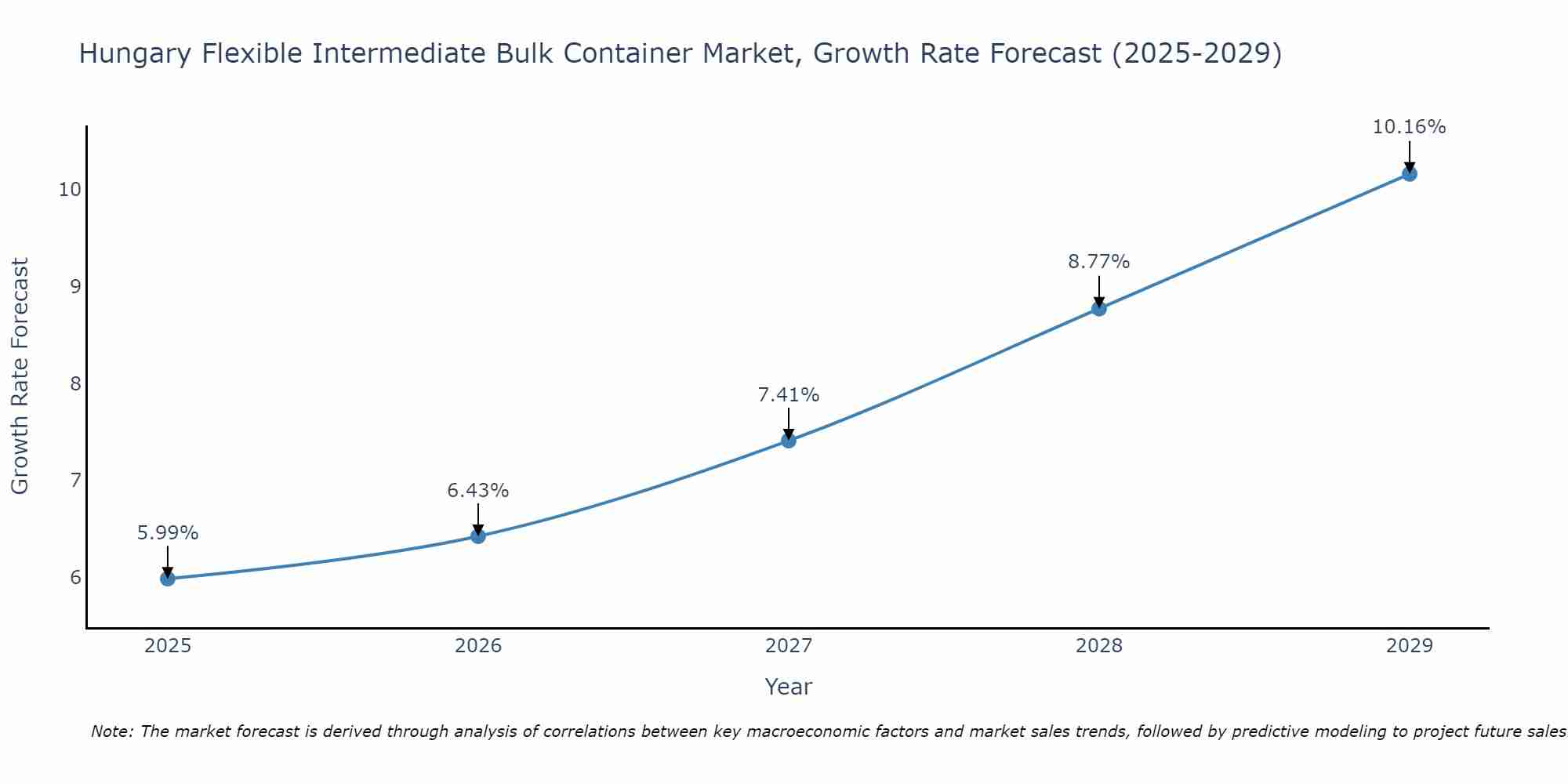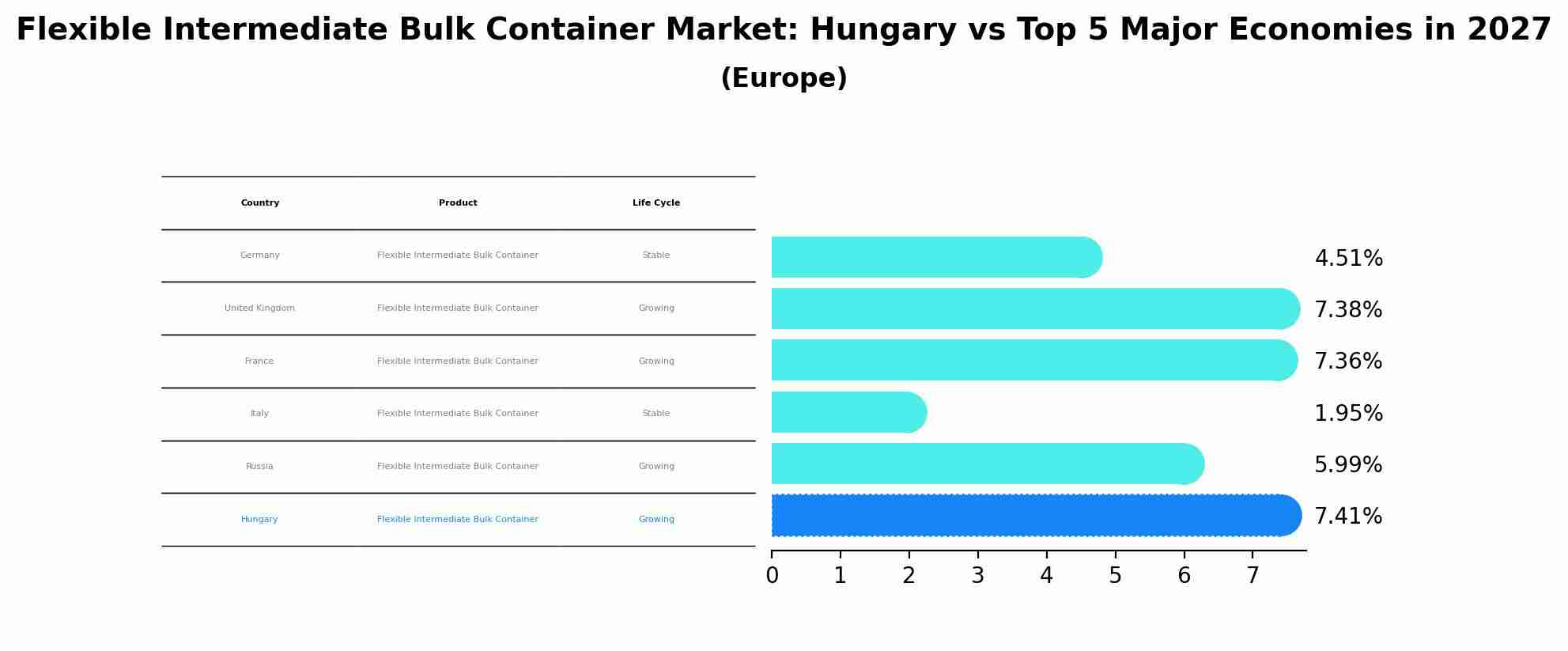Hungary Flexible Intermediate Bulk Container Market Outlook | Trends, Revenue, Forecast, Share, Analysis, Companies, Industry, Size, Value, Growth & COVID-19 IMPACT
| Product Code: ETC373879 | Publication Date: Aug 2022 | Updated Date: Jul 2025 | Product Type: Market Research Report | |
| Publisher: 6Wresearch | Author: Sumit Sagar | No. of Pages: 75 | No. of Figures: 35 | No. of Tables: 20 |
Hungary Flexible Intermediate Bulk Container Market Size Growth Rate
The Hungary Flexible Intermediate Bulk Container Market is poised for steady growth rate improvements from 2025 to 2029. Commencing at 5.99% in 2025, growth builds up to 10.16% by 2029.

Flexible Intermediate Bulk Container Market: Hungary vs Top 5 Major Economies in 2027 (Europe)
The Flexible Intermediate Bulk Container market in Hungary is projected to grow at a growing growth rate of 7.41% by 2027, highlighting the country's increasing focus on advanced technologies within the Europe region, where Germany holds the dominant position, followed closely by United Kingdom, France, Italy and Russia, shaping overall regional demand.

Hungary Flexible Intermediate Bulk Container Market Synopsis
The Hungary Flexible Intermediate Bulk Container (FIBC) market is experiencing steady growth due to the increasing demand for efficient and cost-effective packaging solutions in various industries such as agriculture, pharmaceuticals, chemicals, and construction. FIBCs offer advantages like easy handling, transportation, and storage of bulk goods, thus making them popular among businesses looking to streamline their logistics operations. The market is driven by factors such as the rise in international trade, expansion of the e-commerce sector, and growing awareness about sustainable packaging practices. Key players in the Hungary FIBC market are focusing on product innovation, customization, and strategic partnerships to gain a competitive edge. With a favorable economic outlook and a growing emphasis on sustainability, the Hungary FIBC market is poised for further expansion in the coming years.
Hungary Flexible Intermediate Bulk Container Market Trends
The Hungary Flexible Intermediate Bulk Container (FIBC) market is experiencing several key trends. One prominent trend is the increasing demand for sustainable and environmentally friendly FIBCs made from recycled materials or with biodegradable properties. This shift towards eco-friendly solutions is driven by growing awareness of environmental issues and regulatory pressures. Another significant trend is the rising adoption of FIBCs in various industries such as agriculture, food and beverage, chemicals, and construction due to their cost-effectiveness, durability, and efficiency in bulk packaging and transportation. Additionally, advancements in FIBC design and technology, such as the development of anti-static FIBCs for hazardous materials handling, are also shaping the market. Overall, the Hungary FIBC market is witnessing a shift towards sustainability, increased adoption across industries, and innovation in product offerings.
Hungary Flexible Intermediate Bulk Container Market Challenges
In the Hungary Flexible Intermediate Bulk Container (FIBC) market, challenges include increasing competition from low-cost manufacturing countries, fluctuating raw material prices, and evolving regulatory standards impacting production processes. The market is also affected by the availability of skilled labor and the need for continuous innovation to meet changing customer demands. Additionally, environmental concerns and sustainability requirements are becoming more important, leading to the need for FIBC manufacturers to invest in eco-friendly materials and production practices. Adapting to these challenges requires companies in the Hungary FIBC market to focus on efficiency, quality control, and differentiation strategies to maintain a competitive edge in the industry.
Hungary Flexible Intermediate Bulk Container Market Investment Opportunities
The Hungary Flexible Intermediate Bulk Container (FIBC) market presents promising investment opportunities due to the growing demand for cost-effective and efficient bulk packaging solutions across various industries such as agriculture, chemicals, food and beverages, and construction. With increasing industrial activities and international trade, the need for FIBCs to transport and store large quantities of goods is expected to rise. Investors can consider entering the Hungary FIBC market by investing in FIBC manufacturing companies, expanding distribution networks, or introducing innovative and sustainable FIBC solutions. Additionally, leveraging technological advancements such as automation and digitalization in FIBC production processes can enhance operational efficiency and competitiveness in the market. Overall, the Hungary FIBC market offers potential for growth and profitability for investors looking to capitalize on the increasing demand for bulk packaging solutions.
Jordan Agar Market Government Policies
In Hungary, the Flexible Intermediate Bulk Container (FIBC) market is subject to government policies related to packaging and waste management. The Hungarian government has implemented regulations to promote sustainable packaging solutions, including FIBCs, to reduce environmental impact and encourage recycling. These policies aim to ensure that FIBCs meet quality and safety standards, as well as promote the use of eco-friendly materials in their production. Additionally, waste management regulations require proper disposal and recycling of FIBCs to minimize environmental pollution and promote a circular economy. Overall, the government`s focus on sustainable packaging and waste management practices directly influences the operations and growth of the FIBC market in Hungary.
Hungary Flexible Intermediate Bulk Container Market Future Outlook
The Hungary Flexible Intermediate Bulk Container (FIBC) market is expected to witness steady growth in the coming years due to increasing demand across various industries such as agriculture, construction, and chemicals. Factors driving this growth include the rising need for efficient storage and transportation solutions, as well as the growing focus on sustainability and cost-effectiveness. The market is also likely to benefit from technological advancements leading to the development of innovative and customizable FIBC solutions. However, challenges such as fluctuating raw material prices and stringent regulations regarding packaging materials could impact market growth. Overall, with the increasing adoption of FIBCs for bulk packaging needs, the Hungary market is anticipated to expand, offering opportunities for market players to capitalize on the growing demand.
Key Highlights of the Report:
- Hungary Flexible Intermediate Bulk Container Market Outlook
- Market Size of Hungary Flexible Intermediate Bulk Container Market, 2021
- Forecast of Hungary Flexible Intermediate Bulk Container Market, 2031
- Historical Data and Forecast of Hungary Flexible Intermediate Bulk Container Revenues & Volume for the Period 2018 - 2031
- Hungary Flexible Intermediate Bulk Container Market Trend Evolution
- Hungary Flexible Intermediate Bulk Container Market Drivers and Challenges
- Hungary Flexible Intermediate Bulk Container Price Trends
- Hungary Flexible Intermediate Bulk Container Porter's Five Forces
- Hungary Flexible Intermediate Bulk Container Industry Life Cycle
- Historical Data and Forecast of Hungary Flexible Intermediate Bulk Container Market Revenues & Volume By Product for the Period 2018 - 2031
- Historical Data and Forecast of Hungary Flexible Intermediate Bulk Container Market Revenues & Volume By Type A for the Period 2018 - 2031
- Historical Data and Forecast of Hungary Flexible Intermediate Bulk Container Market Revenues & Volume By Type B for the Period 2018 - 2031
- Historical Data and Forecast of Hungary Flexible Intermediate Bulk Container Market Revenues & Volume By Type C for the Period 2018 - 2031
- Historical Data and Forecast of Hungary Flexible Intermediate Bulk Container Market Revenues & Volume By Type D for the Period 2018 - 2031
- Historical Data and Forecast of Hungary Flexible Intermediate Bulk Container Market Revenues & Volume By End-Use for the Period 2018 - 2031
- Historical Data and Forecast of Hungary Flexible Intermediate Bulk Container Market Revenues & Volume By Food for the Period 2018 - 2031
- Historical Data and Forecast of Hungary Flexible Intermediate Bulk Container Market Revenues & Volume By Chemical for the Period 2018 - 2031
- Historical Data and Forecast of Hungary Flexible Intermediate Bulk Container Market Revenues & Volume By Pharmaceuticals for the Period 2018 - 2031
- Historical Data and Forecast of Hungary Flexible Intermediate Bulk Container Market Revenues & Volume By Others for the Period 2018 - 2031
- Hungary Flexible Intermediate Bulk Container Import Export Trade Statistics
- Market Opportunity Assessment By Product
- Market Opportunity Assessment By End-Use
- Hungary Flexible Intermediate Bulk Container Top Companies Market Share
- Hungary Flexible Intermediate Bulk Container Competitive Benchmarking By Technical and Operational Parameters
- Hungary Flexible Intermediate Bulk Container Company Profiles
- Hungary Flexible Intermediate Bulk Container Key Strategic Recommendations
Frequently Asked Questions About the Market Study (FAQs):
Export potential assessment - trade Analytics for 2030
Export potential enables firms to identify high-growth global markets with greater confidence by combining advanced trade intelligence with a structured quantitative methodology. The framework analyzes emerging demand trends and country-level import patterns while integrating macroeconomic and trade datasets such as GDP and population forecasts, bilateral import–export flows, tariff structures, elasticity differentials between developed and developing economies, geographic distance, and import demand projections. Using weighted trade values from 2020–2024 as the base period to project country-to-country export potential for 2030, these inputs are operationalized through calculated drivers such as gravity model parameters, tariff impact factors, and projected GDP per-capita growth. Through an analysis of hidden potentials, demand hotspots, and market conditions that are most favorable to success, this method enables firms to focus on target countries, maximize returns, and global expansion with data, backed by accuracy.
By factoring in the projected importer demand gap that is currently unmet and could be potential opportunity, it identifies the potential for the Exporter (Country) among 190 countries, against the general trade analysis, which identifies the biggest importer or exporter.
To discover high-growth global markets and optimize your business strategy:
Click Here- Single User License$ 1,995
- Department License$ 2,400
- Site License$ 3,120
- Global License$ 3,795
Search
Thought Leadership and Analyst Meet
Our Clients
Related Reports
- India Switchgear Market Outlook (2026 - 2032) | Size, Share, Trends, Growth, Revenue, Forecast, Analysis, Value, Outlook
- Pakistan Contraceptive Implants Market (2025-2031) | Demand, Growth, Size, Share, Industry, Pricing Analysis, Competitive, Strategic Insights, Strategy, Consumer Insights, Analysis, Investment Trends, Opportunities, Revenue, Segments, Value, Segmentation, Supply, Forecast, Restraints, Outlook, Competition, Drivers, Trends, Companies, Challenges
- Sri Lanka Packaging Market (2026-2032) | Outlook, Competition, Drivers, Trends, Demand, Pricing Analysis, Competitive, Strategic Insights, Companies, Challenges, Strategy, Consumer Insights, Analysis, Investment Trends, Opportunities, Growth, Size, Share, Industry, Revenue, Segments, Value, Segmentation, Supply, Forecast, Restraints
- India Kids Watches Market (2026-2032) | Strategy, Consumer Insights, Analysis, Investment Trends, Opportunities, Growth, Size, Share, Industry, Revenue, Segments, Value, Segmentation, Supply, Forecast, Restraints, Outlook, Competition, Drivers, Trends, Demand, Pricing Analysis, Competitive, Strategic Insights, Companies, Challenges
- Saudi Arabia Core Assurance Service Market (2025-2031) | Strategy, Consumer Insights, Analysis, Investment Trends, Opportunities, Growth, Size, Share, Industry, Revenue, Segments, Value, Segmentation, Supply, Forecast, Restraints, Outlook, Competition, Drivers, Trends, Demand, Pricing Analysis, Competitive, Strategic Insights, Companies, Challenges
- Romania Uninterruptible Power Supply (UPS) Market (2026-2032) | Industry, Analysis, Revenue, Size, Forecast, Outlook, Value, Trends, Share, Growth & Companies
- Saudi Arabia Car Window Tinting Film, Paint Protection Film (PPF), and Ceramic Coating Market (2025-2031) | Strategy, Consumer Insights, Analysis, Investment Trends, Opportunities, Growth, Size, Share, Industry, Revenue, Segments, Value, Segmentation, Supply, Forecast, Restraints, Outlook, Competition, Drivers, Trends, Demand, Pricing Analysis, Competitive, Strategic Insights, Companies, Challenges
- South Africa Stationery Market (2025-2031) | Share, Size, Industry, Value, Growth, Revenue, Analysis, Trends, Segmentation & Outlook
- Afghanistan Rocking Chairs And Adirondack Chairs Market (2026-2032) | Size & Revenue, Competitive Landscape, Share, Segmentation, Industry, Value, Outlook, Analysis, Trends, Growth, Forecast, Companies
- Afghanistan Apparel Market (2026-2032) | Growth, Outlook, Industry, Segmentation, Forecast, Size, Companies, Trends, Value, Share, Analysis & Revenue
Industry Events and Analyst Meet
Whitepaper
- Middle East & Africa Commercial Security Market Click here to view more.
- Middle East & Africa Fire Safety Systems & Equipment Market Click here to view more.
- GCC Drone Market Click here to view more.
- Middle East Lighting Fixture Market Click here to view more.
- GCC Physical & Perimeter Security Market Click here to view more.
6WResearch In News
- Doha a strategic location for EV manufacturing hub: IPA Qatar
- Demand for luxury TVs surging in the GCC, says Samsung
- Empowering Growth: The Thriving Journey of Bangladesh’s Cable Industry
- Demand for luxury TVs surging in the GCC, says Samsung
- Video call with a traditional healer? Once unthinkable, it’s now common in South Africa
- Intelligent Buildings To Smooth GCC’s Path To Net Zero


















